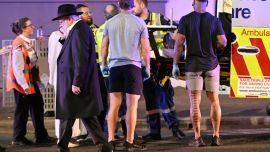President Javier Milei’s government will stoke controversy this Sunday as Argentina marks 48 years since the coup that delivered the nation’s most brutal military dictatorship to power.
The La Libertad Avanza leader’s government is set to release a video message on March 24, Argentina’s Day of National Day of Memory for Truth and Justice, that marks the coup d’etat that brought the 1976-1983 dictatorship to power.
There will be at least three separate rallies on Sunday, with most demonstrators set to gather at the Plaza de Mayo, in front of the Casa Rosada.
According to reports, the ruling party plans to mark the day with a video calling for a “complete memory” of the conflict – a phrase linked to the two demons theory that downplays state terrorism and has been voiced regularly by Vice-President Victoria Villarruel.
“We hope it will be a day of reflection for everyone, in absolute tranquillity and peace,” said Presidential Spokesman Manuel Adorni at a media briefing last week.
“If there’s anything else left to say, it will be said or published on the 24th [of March] itself,” he added.
The director of the video is libertarian documentarist Santiago Oria and the intention is that the video is broadcast on Sunday, the same day human rights groups take to the streets to mark the coup.
Former guerrilla fighter Luis Labraña, former head of the SIDE intelligence service, Juan Bautista ‘Tata’ Yofre, and relatives of the former captain Humberto Viola are also said to have been involved in the creation of the video.
Argentina’s shift to democracy in 1983 and the years of uninterrupted democratic rule that have followed have been accompanied by a process of memory, truth and justice that has seen human rights violators jailed for crimes against humanity.
Multiple trials featuring the testimony of eye-witnesses and survivors detailed the secret network of detention and torture centres that the dictatorship’s leaders established across the country to persecute and kill its enemies.
According to the estimates of human rights organisations, some 30,000 people were disappeared by the military junta during the era of state terrorism.
Both Milei and his vice-president, Victoria Villarruel – who is close to the military and has relations with a number of jailed dictatorship-era criminals – question the number of disappeared agreed upon by human rights organisations (30,000) and claim that the real figure is far less (around 8,700).
Declassified documents released in 2016 indicated the security forces had killed around 22,000 people between 1975 and 1978.
Reports last week suggested that some government officials, including Villarruel, are lobbying for a decree that would allow military personnel convicted of crimes against humanity during the dictatorship and who are aged over 70 will be entitled to serve out the rest of their sentence under house arrest.
Defence Minister Luis Petri denied those reports in a press conference last Thursday.
Villarruel, who comes from a military family, is the founder of the CELTYV organisation (Centre for Legal Studies on Terorrism and its Victims), which legally assists people who died at the hands of armed terrorist organisations.
The NGO campaigns for a “complete memory” of the dictatorship era, highlighting those killed by armed groups as the ERP or Montoneros.
Sociologist Daniel Feierstein, a specialist in genocidal social practices and a former president of the International Association of Genocide Scholars, has suggested that Villarruel is bringing back a “new version of the theory of the two demons,” which attempts to claim that in 1970s Argentina there was a kind of conflict of equals.
According to Feierstein, with the turn towards the victims, “instead of equating guerrillas with the military, it equates the disappeared with guerrilla casualties,” the expert described.
– TIMES/PERFIL




















Comments